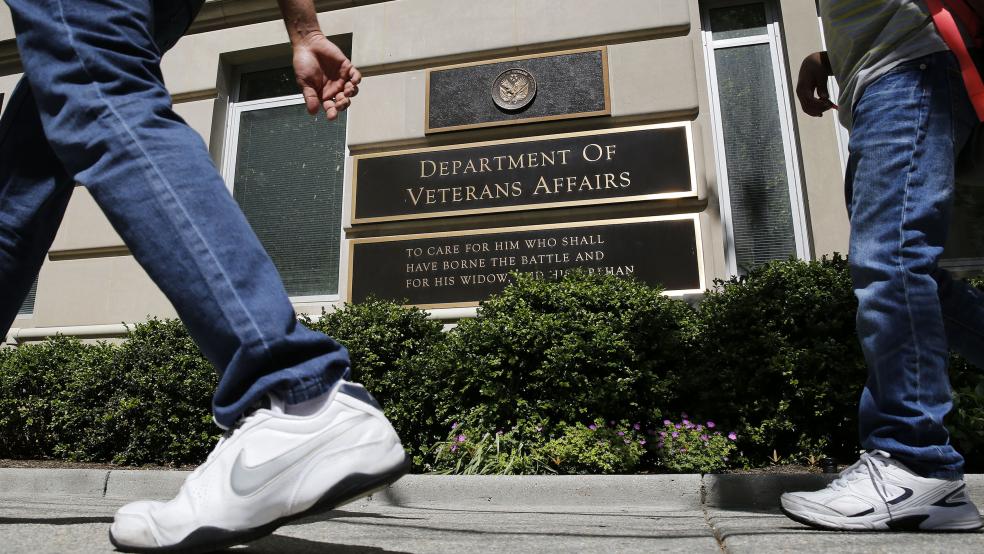The scandalous practice of Veterans Affairs Department medical centers hiding or obfuscating the intolerably long wait lists for veterans in need of medical treatment is just the tip of the iceberg, as we are now learning.
Administrators of VA medical centers across the country have repeatedly suppressed whistleblowers’ complaints about shoddy medical care and conditions, gross neglect of mental patients, unlawful prescriptions for narcotics and scores other examples of malpractice that may have jeopardized the lives of patients, according to a letter sent to President Obama by a federal watchdog agency on Monday.
Related: Congress Would Give VA a Blank Check to Fix Health Care Mess
The report by the Office of Special Counsel (OSC), an independent agency, substantiated a long list of these and other problems raised by workers but frequently dismissed by VA officials as “harmless” errors. The OSC described the officials’ conduct as part of a years-long “culture of non-responsiveness.”
“Too frequently, the VA has failed to use information from whistleblowers to identify and address systemic concerns that impact patient care,” wrote U.S. Special Counsel Carolyn N. Lerner. VA officials have refused to acknowledge “the severity of systemic problems,” she added, which prevented them from taking necessary steps to provide quality care to veterans.
“As the VA re-evaluates patient care practices, I recommend that the Department’s new leadership also review its process for responding to OSC whistleblower cases,” wrote Lerner
Related: VA Bill Means a New $50 Billion Entitlement
The scandal first erupted April 30 when CNN reported that at least 40 U.S. veterans had died while awaiting care at the Phoenix, Ariz., VA medical center. The controversy ultimately triggered investigations by Congress, the White House, and the Justice Department, and led to the resignation of VA Secretary Eric K. Shinseki on May 30. Sloan Gibson, who took over as acting secretary, said he accepts the OSC’s recommendations and directed a comprehensive review by the Office of the Medical Inspector’s operations to be completed in two weeks, The Washington Post reported.
“I am deeply disappointed not only in the substantiation of allegations raised by whistleblowers, but also in the failures within VA to take whistleblower complaints seriously,” Gibson said in a statement.
Lerner said her agency is still investigating over 50 whistleblower disclosures, “all of which allege threat to patient health or safety.” These cases represent more than a quarter of all matters referred by OSC for investigation.
An internal VA audit released June 9 concluded that more than 120,000 veterans were left waiting or never got care, according to CNN. Moreover, schedulers were under pressure to employ inappropriate practices to make waiting times appear more favorable.
Related: Shinseki Falls on Sword in VA Scandal
While more horror stories may surface as investigations proceed, here are seven of the worst outrages at VA medical centers as outlined in the OSC’s letter to the president:
1) A long-term mental health care facility in Brockton, Mass., neglected patients and let them languish for years without adequate attention or treatment. One veteran with a 100 percent service-connected psychiatric condition lived at the facility from 2005 to 2013, yet in all that time had only one psychiatric note written in his medical chart – in 2012, when he was first examined by a whistleblower.
A second veteran was admitted to the same facility in 2003 with “significant and chronic mental health issues,” yet his first comprehensive psychiatric evaluation did not happen until 2011, according to the report. “No medication assessments or modifications occurred until the 2011 consultation,” said the OSC.
2) Rampant problems with patient care existed at the Jackson, Miss., VA medical center – first revealed in September 2013 – that included “improper credentialing of providers, inadequate review of radiology images, unlawful prescriptions for narcotics, noncompliant pharmacy equipment used to compound chemotherapy drugs, and unsterile medical equipment,” according to the report. There were also chronic staffing shortages in the primary care unit. Administrators sought to hide the problem with a “ghost clinic” system in which veterans were scheduled for appointments in clinics with no assigned provider, “resulting in excessive wait times and veterans leaving the facility without receiving treatment,” according to the report.
3) In Montgomery, Ala., a health care provider specializing in diseases of the respiratory tract copied prior notes to represent current readings in over 1,200 patient records, “likely resulting in inaccurate patient health information being recorded,” the report said. The OSC, however, couldn’t determine whether this practice endangered the health of the patients.
4) A VA facility in Grand Junction, Colo., had elevated levels of Legionella bacteria in its drinking water. The bacteria can cause Legionnaires Disease, a potentially lethal pneumonia-type illness. Despite complaints, standard maintenance and cleaning procedures required to prevent bacterial growth were not performed.
5) There was subpar patient care at a VA facility in Little Rock, Ark., including one incident “when suction equipment was unavailable when it was needed to treat a veteran who later died” – although investigators failed to directly link the death and the inadequate treatment.
6) In San Juan, Puerto Rico, “nursing staff neglected elderly residents by failing to assist with essential daily activities such as bathing, eating, and drinking.”
7) Health care professionals at a VA facility in Buffalo, N.Y., did not always comply with sterilization standards for wearing personal protective equipment. The workers occasionally failed to place indicator strips in surgical trays and mislabeled sterile instruments.
Top Reads from The Fiscal Times:




